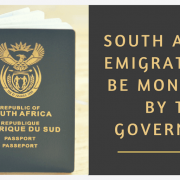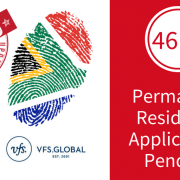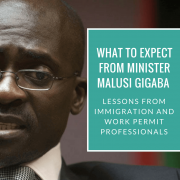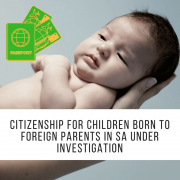Renewing general work visas challenging in South Africa
/in Archived, News /by Marisa JacobsHolders of general work visas, the most commonly sought visa for foreign professionals working and living in South Africa are finding it practically impossible to renew their visas.
Applications are regularly rejected for reasons not given or because the Department of Labour has found that issuing the visa could discriminate against South Africans, even in cases where the applicants’ jobs depend on them being fluent in a language not spoken in South Africa.
The Department has added layers of bureaucracy and inconsistency in carrying out directives and applying the law, compounding delays in a process already fraught with hurdles.
Stefanie de Saude, of De Saude Attorneys, hears reports almost daily of professionals who have lived and worked legally in South Africa for years, now denied renewed work visas and facing the prospect of losing their homes and jobs and disrupting their families.
The law requires the Department of Labour to assess each application it receives to determine whether it complies with the regulations 18(3) (a) to (e). These regulations require, amongst other things, that a diligent search is carried out for a job candidate in South Africa before a foreign applicant is appointed, and that the skills or experience of a suitable South African is not available in the labour market. Thereafter the Department of Labour will issue a certificate of recommendation to the Department of Home Affairs.
In theory, this should be a relatively simple process taking no more than around 30 days. In practice, however, the assessment runs to site visits, SARS checks and more, and can take in the order of seven months to complete. In many cases, the Department of Labour rejects the application at which point, Home Affairs rejects it too, citing a ‘negative recommendation from the Department of Labour’ without providing adequate reasons for the rejection.
Limited scope to appeal
There is limited scope to appeal when the reason for the application being denied has not been disclosed.
“Indeed, in our work on numerous such applications, we have only twice been told why the certificates were not issued – and in both cases, the Department of Labour had found that the foreign language requirements discriminated against South Africans. Unfortunately, for the employers and applicants concerned, those foreign language skills were vital in order to carry out the work,” explains de Saude.
The gap between theory and practice is confusing for all concerned. In a recent High Court judgment, the applicant in the case applied for a waiver of the need for a Department of Labour certificate. He was rejected, for reasons that we have seen before – in essence, the decision maker reiterated the basis of the requirement of the Department of Labour certificate, without considering whether a waiver from the usual rules was deserved in this case. On review, the judge found that that the decision maker had misapplied his/her mind, and had been needlessly rigid.
Despite this judgement, we still receive waiver refusals for exactly the same reason and the outcome of work visa applications has begun to look like a foregone conclusion – bad news for applicants.
Critical skills also affected
These challenges are also affecting critical skills visas to some degree. Where once, applicants in possession of scarce and critical skills might have been issued with five-year visas, without the need for an employment contract at the time of application, they are now being issued with 12-month visas, bound to particular employers, so undermining the country’s efforts to bring important skills resources into South Africa and support much-needed skills transfer. The list itself lacks clarity and fails to support the intentions of the law. For example, the Department of Home Affairs incorrectly interprets the BPO category as covering only call centres and no other BPO services, therefore any critical skills applicants in this category would have to work in a call centre in order for the visa application to be approved. The emphasis is therefore not on the skill at all but rather the sector.
By Stefanie de Saude
As published by http://www.bizcommunity.com





